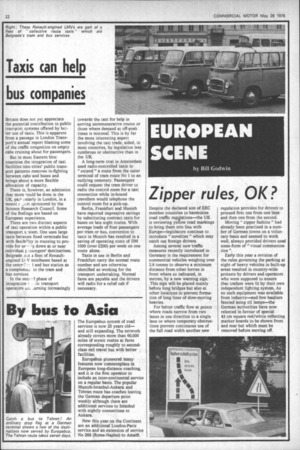EUROPEAN SCENE
Page 24

If you've noticed an error in this article please click here to report it so we can fix it.
by Bill Godwin
Zipper rules, OK?
Despite the declared aim of EEC member countries to harmonise road traffic regulations—the UK is reviewing yellow road markings to bring them into line with Europe—legislators continue to introduce " novelties " which may catch out foreign drivers.
Among several new traffic measures recently introduced in Germany is the requirement for commercial vehicles weighing over 2,8 tonnes to Observe a minimum distance from other lorries in front where so indicated, in metres, by a new warning sign. This sign will be placed mainly before long bridges but also at other locations to prevent formation of long lines of slow-moving heavies.
For bdtter traffic flow at points Where roads narrow from two lanes in one direction to a single lane or where temporary obstructions prevent continuous use a the full road width another new regulation provides for drivers to proceed first one from one lane and then one from the second.
Moving " zipper fashion" had already been practised in a number of German towns on a voluntary basis and seemed to work well, always provided drivers used some form of "visual communication ".
Early this year a revision of the rules governing the parking at night of heavy vehicles in built-up areas resulted in country-wide protests by drivers and operators who were supposed to ensure that trailers were lit by their own independent lighting system. As no such equipment was available from Industry—end few ,hauliers fancied using oil lamps—the German authorities have now relented in favour of special 43 cm square red/white reflecting marker boards to be shown front and rear but which must be removed before moving off.




















































































